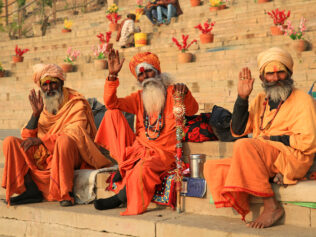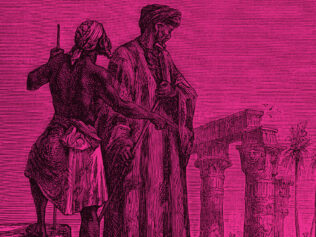
Discovery is the sole purpose of travel. There are two kinds of journey, described in Islam by the words rihla and safar. A rihla is a journey on which we embark to discover the world and other cultures; to learn and acquire knowledge. It should not be confused with tourism. A holiday trip is neither a journey, nor a migration. People migrate in search of a better life or to flee war and persecution, whereas journeys are of a voluntary nature. They must be consciously planned and are often time-consuming, not only for the hours spent on the road and at various halts, but also at the final destination. In order to meet other people and cultures, to learn about them and from them, you must learn their languages, beliefs and customs. You must live among them, building a second home in a new place.
Ancient Muslim travellers, such as Ibn Jubair in the 12th century, or Ibn Battuta, who traversed the world in the 14th century, left us their wonderful rihlas (or travelogues). Ibn Jubair visited the entire Arabian Peninsula, writing a book that now provides us with priceless information on medieval Islamic art and architecture. He collected experiences like a magpie collects trinkets, fastidiously describing all that he saw. Ibn Battuta’s rihla is a collection of the weird and wonderful things he observed during his breathtaking adventures. In the 10th century, another Muslim traveller reached Scandinavia: Ibn Fadlan’s travelogue is a valuable source of knowledge about the Vikings and Volga–Kama Bulghar. Muslim scholars considered that a rihla compelled the true traveller to pass on the discoveries and knowledge gained during their travels to others – any serious undertaking should result in a serious body of work.
A safar also involves travel, but is more of an inner journey to discover and transform oneself through vital achievements. It can be spiritual, sometimes becoming a vital element in a belief system or culture. For example, the Muslim Hajj plays an incredibly important role – a pilgrimage to Mecca, known as the fifth pillar of Islam; arduous and demanding, entailing numerous rituals. Its ultimate goal is spiritual enlightenment. A similar example is the Way of Saint James, leading to the Cathedral of Santiago de Compostela in Spain. But a safar is not necessarily a pilgrimage. It can mean all types of journey that elicit reflection, allowing a better realization of how everything around us is interconnected. What counts is not the vistas or the worlds through which the wanderer passes, but the people they meet along the way; meetings that lead us to doubt our former assumptions, forcing us to change inwardly and form a new synthesis.
I have been on both kinds of journeys. I have visited Islamic countries, from Morocco to Indonesia, wishing to observe the pros and cons of Muslim societies. I have undertaken the pilgrimage to Mecca more than once. I have also been on a safar and understood just how unwise I had been before. I may state without a shadow of a doubt that if you’ve never travelled, you’ve never lived. If you do not venture far out into the world, you will never acquire knowledge. If you do not attempt to discover yourself, you can never know yourself.
Translated by Mark Bence







